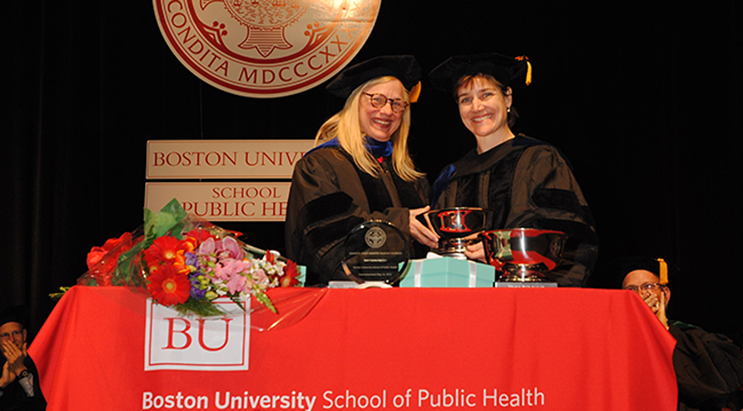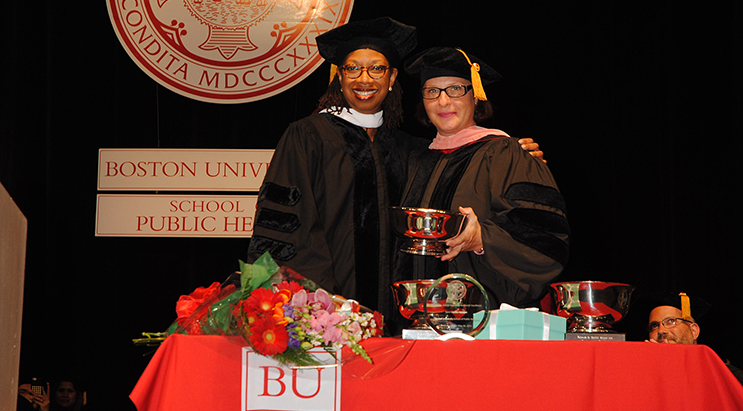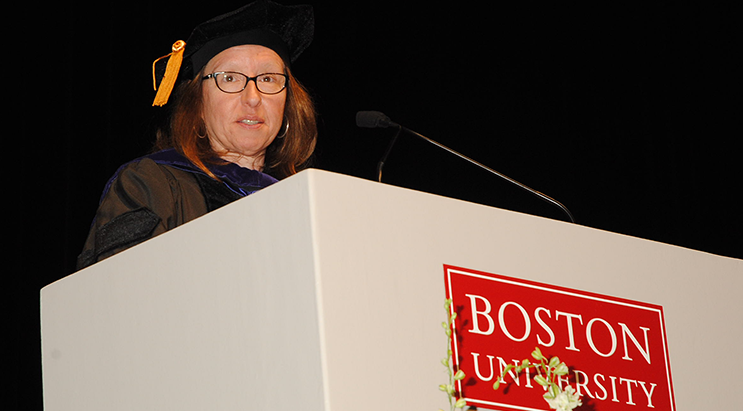Mass Health Commissioner to SPH Graduates: Eradicate Disparities.
Massachusetts Public Health Commissioner Monica Bharel issued a pointed appeal to the 290 graduates of the School of Public Health assembled Saturday in Agganis Arena: Get us to a place where zip codes don’t matter.
“Let me be clear,” said Bharel, who was appointed to her post earlier this year after serving as chief medical officer of the Boston Health Care for the Homeless Program, “the biggest public health risk facing our society today is endemic health disparities. . . . The neighborhood you were born in, the school you go to, your parents’ health—all of these things directly and dramatically influence whether you develop asthma, diabetes, heart disease, or die young.”
In her address to the graduates, Bharel said reducing economic and racial health disparities was her “primary priority” as commissioner. She noted that her department had a proud history of leadership in tackling cholera and smallpox and ensuring that schoolchildren were vaccinated, and she touted Boston as having the best medical care in the world.
But, she added, “Lost in that remarkable narrative are the often invisible pockets of people who, in a very real way, live in a different Massachusetts.”
Referencing data gathered by Dean Sandro Galea, Bharel illustrated the wide disparities among Boston neighborhoods by comparing health indicators of residents living near MBTA stations. The rate of diabetes at the Dudley Square T stop is four times as high as at the Arlington stop, she said, while the premature death rate is more than twice as high. The two stops are about two miles apart.
“These numbers don’t reflect the proximity to (medical) care,” she explained. “This is something else—something that is much deeper and much more disturbing.”
Income, education, and other personal circumstances directly impact the health of families and subsequent generations. As an example, she said, research has shown that people with high rates of childhood trauma have triple the risk of lung cancer and three and a half times the risk of heart disease.
“We must ensure that vulnerable populations receive better integrated and de-stigmatized care,” she said. “From the bedside to the halls of bureaucracy, we need to focus our effort on this real but treatable problem.”
Bharel, who received her medical degree from the School of Medicine in 1994 and completed a residency and chief residency in internal medicine at Boston Medical Center, recalled her early interest in the social determinants of health, as a teenager visiting relatives in New Delhi, India. On frequent walks to the market, she had noticed a frail elderly man who lived by the roadside. One day, as she passed by, he lay dead, covered by a sheet. As others walked past, she remembered wondering not what he died from, but why he was there in the first place.
“What can be done so that that person, or his children, never ends up on that roadside to begin with?” she said.
She urged the graduates to become “relentless” activists for health equity.
“Identify the currents of injustice, harness that current, empower the change you believe in to reach a place of fairness and equity where zip codes don’t matter,” she said.
Bharel, who oversees a 3,000-employee department with a $540 million budget, said Massachusetts has the ability to become a leader in addressing disparities by using data to target interventions. She said she is committed to collecting detailed population-level risk and outcome data, which can help to inform policy.
Galea, who took over as dean in January, said Bharel’s message resonated at SPH.
“We see ourselves as leading the effort to improve the health of the public, now into the future. Dr. Bharel is at the forefront of those who can make change happen,” he told the crowd of graduates and their families.
Student speaker Pawandeep Kaur, a social and behavioral sciences concentrator, also urged the graduates to advocate for fairness and equity. A native of Oman who is the first member of her family to attend college, she told her classmates that “our circumstances and sometimes sheer luck” determine opportunities.
“Not everyone is this lucky. There continues to exist systemic oppression” on the basis of race, gender, and sexual identity, she said. “We have a moral obligation to make the best of this . . . and not waste this opportunity.”
Two faculty members were honored for their teaching and scholarship. Christopher Gill, an infectious disease specialist who directs the Pharmaceuticals Program, received the Norman A. Scotch Award for Excellence in Teaching, and Josée Dupuis, professor and acting chair of biostatistics, received the Faculty Career Award in Research and Scholarship.
Graduate Sami Hamdan was awarded the Leonard H. Glantz Award for Academic Excellence.
A total of 530 students graduated with degrees from SPH in the 2014-2015 school year.
Submitted by: Lisa Chedekel







